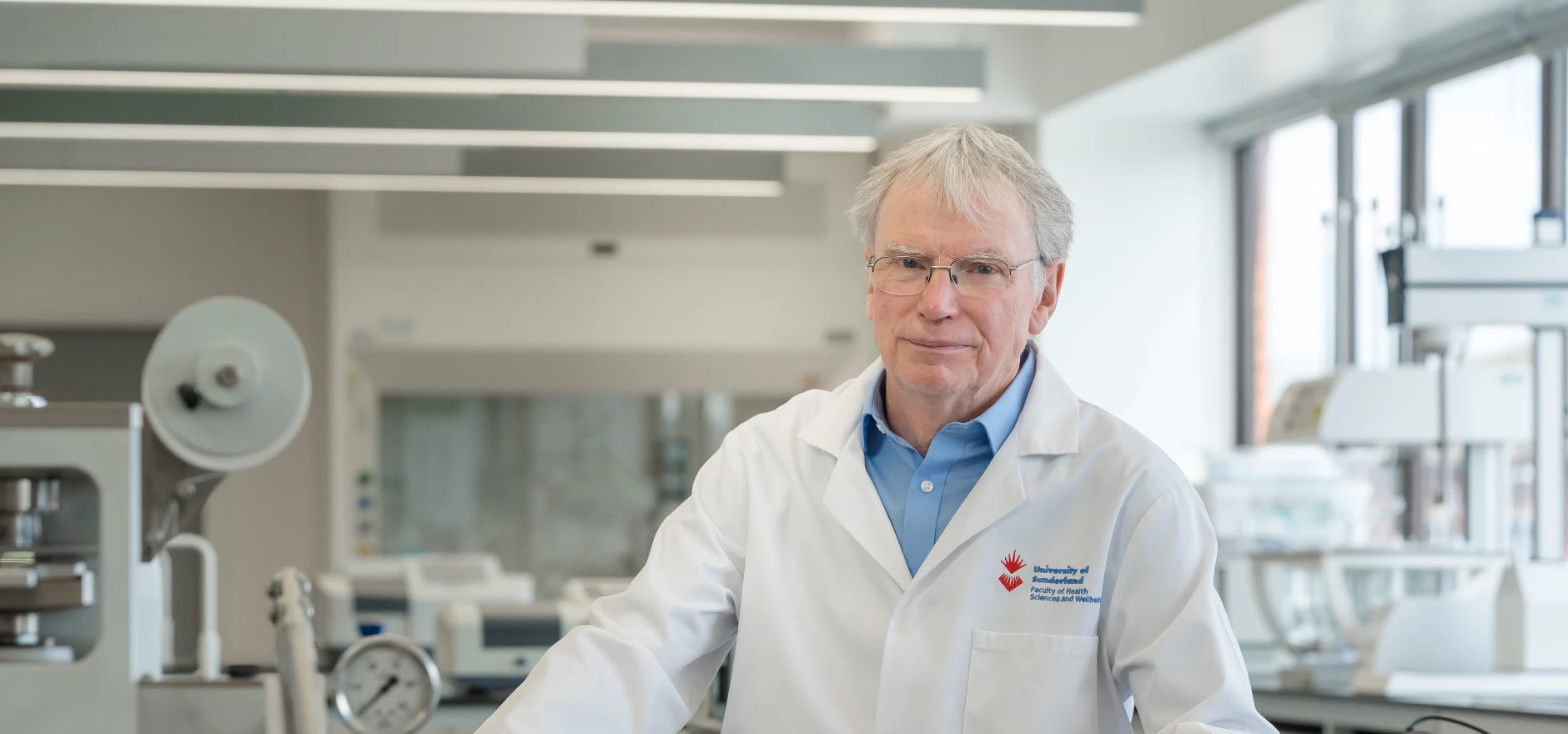
Researchers receive £3.9 million for cystinosis trial
A North East university team is set to advance a life-changing treatment for a rare genetic disease.
Researchers at the University of Sunderland have received £3.9 million from the Medical Research Council (MRC) to take a novel cystinosis drug into clinical trials.
The drug, CF10, was originally designed by the late Professor Roz Anderson, who dedicated her career to improving outcomes for patients with the condition.
Professor Roz Anderson
Cystinosis occurs when the body cannot process cystine, leading to organ damage, particularly in the kidneys, muscles and eyes.
The current and only treatment for the disease, cysteamine, is effective but comes with severe side effects such as nausea, vomiting, bad breath, a poor body odour, ulcers and gut damage, as well as requiring high doses four times a day for life.
By contrast, CF10 is a prodrug that delivers treatment directly to the cells that need it, reducing unpleasant side effects and improving efficacy.
CF10 will be developed and tested through a collaboration involving High Force Research (Durham), which will manufacture the drug, and Newcastle Specials at the Royal Victoria Infirmary, part of Newcastle upon Tyne Hospitals NHS Foundation Trust, which will produce the CF10 capsules.
University Hospitals Birmingham NHS Foundation Trust (UHB) and the University of Birmingham will treat patients and manage the first phase of clinical trials, while Birmingham Women’s and Children’s NHS Foundation Trust and CEMAS (Wokingham) will analyse patient samples.
Professor Herbie Newell, professor of drug development at the University of Sunderland and emeritus professor of cancer therapeutics at Newcastle University, who has a background in bringing drugs from discovery to market, is leading the project.
He said: “Professor Roz Anderson discovered CF10 with generous funding from Cystinosis Foundation UK, a patient and carer charity – and the latest funding we have received from the MRC will allow us to give CF10 to patients for the first time.
“Roz was an inspirational and outstanding medicinal chemist.
“The trial this funding has made possible will both offer hope for cystinosis patients and create a lasting legacy for Roz.
“CF10 has the potential to transform the treatment and lives of patients living with cystinosis.”
The first phase of clinical trials will assess safety and effectiveness, building on preclinical work supported by earlier MRC funding.
The trial will be led by Dr Graham Lipkin at Queen Elizabeth Hospital Birmingham, the UK’s only site for the study, where patient volunteers will receive gradually increasing doses to identify an active dose.
Dr Lipkin added: “I’m incredibly proud to be leading this trial here at QEHB, which could make a real difference for patients with this rare condition.
“Cystinosis is a dreadful inherited disorder that usually presents in early infancy, initially damaging the kidneys and eyes and often requiring dialysis or a kidney transplant.
“Over time, it can also cause diabetes, hormone deficiencies, and progressive muscle weakness, resulting in loss of strength, swallowing difficulties and chest problems.
“This partnership between UHB, the University of Birmingham, and the University of Sunderland brings together world-class expertise with the potential to set a new standard of care, delivering a treatment that could be truly life-changing for patients.”
Will Newman, chair of Cystinosis Foundation UK, added: "For those living with cystinosis, the daily reality is brutal – relentless medication schedules, sleep deprivation, and harsh side effects from cysteamine.
“CF10 could change everything.
“This new treatment promises fewer doses and virtually no side effects.
“It’s not just a scientific milestone – it’s hope for a brighter future.
“We are hugely grateful to Professor Roz Anderson, Professor Herbie Newell and the fantastic team at Sunderland for advancing CF10 into clinical trials, and to our community whose fundraising efforts have been nothing short of heroic, helping a tiny charity punch far above its weight in drug development.
“If CF10 succeeds, it will be life changing, not just for those in the UK, but for the cystinosis community worldwide.”
Dr Adrian Moore, head of the School of Pharmacy and Pharmaceutical Sciences at the University of Sunderland, added: “Roz embodied the University of Sunderland’s vision that research can change lives and inspire generations to come.
“It has been both a pleasure and an honour for colleagues and external partners to take forward and bring Roz’s work to fruition for the benefit of the cystinosis community.
“This most recent award from the MRC represents the next step in this exciting and much needed journey.”
Looking to promote your product/service to SME businesses in your region? Find out how Bdaily can help →
Enjoy the read? Get Bdaily delivered.
Sign up to receive our daily bulletin, sent to your inbox, for free.








 A year of resilience, growth and collaboration
A year of resilience, growth and collaboration
 Apprenticeships: Lower standards risk safety
Apprenticeships: Lower standards risk safety
 Keeping it reel: Creating video in an authenticity era
Keeping it reel: Creating video in an authenticity era
 Budget: Creating a more vibrant market economy
Budget: Creating a more vibrant market economy
 Celebrating excellence and community support
Celebrating excellence and community support
 The value of nurturing homegrown innovation
The value of nurturing homegrown innovation
 A dynamic, fair and innovative economy
A dynamic, fair and innovative economy
 Navigating the property investment market
Navigating the property investment market
 Have stock markets peaked? Tune out the noise
Have stock markets peaked? Tune out the noise
 Will the Employment Rights Bill cost too much?
Will the Employment Rights Bill cost too much?
 A game-changing move for digital-first innovators
A game-changing move for digital-first innovators
 Confidence the missing ingredient for growth
Confidence the missing ingredient for growth